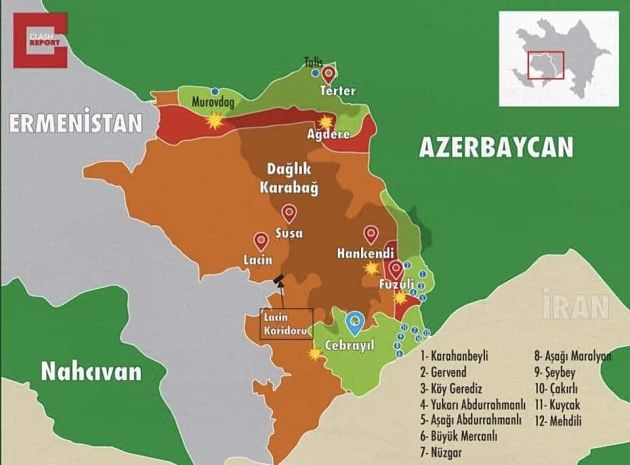Thus, we can summarize the results of the first week of the war for liberation of the occupied territories of Azerbaijan in Nagorno-Karabakh and its surroundings. Meanwhile, the Azerbaijani army has liberated Murovdag, Sukhovushan, Talish, Shukyurbeyli, Erkyon, Dashkesan, Khorovlu, Makhmudlu, Jafarabad, Yuxarı Maralı and Dekal. Despite significant losses on both sides and fierce fighting, the strategic advantage is on the side of the Azerbaijani army, which was obviously better prepared for this war. The Ukrainian military analyst Aleksey Arestovich in his article (https://www.facebook.com/alexey.arestovich/posts/3696130470451006) has well explained the reasons for this and the prospects for the development of the military operations.
In view of such developments, it is clear that no matter how much the Armenian side boasts about its individual successes and no matter how high the losses of the Azerbaijani army may be, the complete defeat of the separatist-occupied formations in Nagorno-Karabakh and the surrounding territories is only a matter of time. That is why Yerevan is now making extraordinary efforts to prevent this scenario from unfolding.
And it is not only about the showy mobilization and Nikol Pashinyan’s calls to the Armenian reservists to take helmets, body armor and rifles and go to Karabakh as volunteers, which will only result in their being ground up as cannon fodder, but will not change the course of the military operations. The main problem is the attempt to involve those who can stop the Azerbaijani advance and thus save the occupation-separatist forces.
First of all, of course, this is Russia, which, together with Armenia, is a member of the Collective Security Treaty Organization (CSTO). Within the framework of the CSTO, Russia is obliged to help Armenia repel aggression. However, it refers to the aggression against its internationally recognized territory, not against the occupied territories of Azerbaijan. Therefore, the Armenian armed forces are trying to provoke the Azerbaijani army to retaliate by attacking the Azerbaijani residential areas from the Armenian territory, which could give Armenia a reason to ask for Russia’s help in repulsing the aggression.
It is also an attempt to win over the West by playing the “Islamic” and “Turkish” threat card, since Armenia sees itself as defending the entire Christian world against them. France, obsessed with Islamophobia, is helping Armenia in this regard. However, neither the rest of Europe, which has its own problems, nor the United States, which is completely focused on its presidential elections, nor NATO, of which Turkey is a member, are in a hurry to follow suit. As in the case of Russia, we can expect serious provocations in order to solve this problem, including allowing accusations against Azerbaijan and Turkey of genocide against the local population or something similar.
On the other hand, it cannot be said that the Azerbaijani leadership does not take any measures to counter these provocations. All in all, it should be noted that despite any possible grievances against Ilham Aliyev’s regime in the past, his political stance today is almost impeccable. He has blamed the current Armenian leadership for the outbreak of this war, accusing it of destroying the peace process through which Azerbaijan hoped to resolve the Karabakh issue without resorting to arms and bloodshed. Moreover, he expressed his readiness to stop the military operations if the Armenian leadership offers a clear peace plan for the de-occupation of the Azerbaijani lands, stressing that the Armenians who want to continue living there will be considered as Azerbaijani citizens. But this time it is not about empty “peace talks”, which have not produced any result other than maintaining the status quo of occupation for 26 years; it is about a concrete de-occupation plan, i.e. a peaceful surrender of the occupied lands of Azerbaijan.
At present, the Armenian side refuses to discuss this scenario, hoping for both military deterrence against the Azerbaijani offensive and the implementation of the two above-mentioned political scenarios. On the other hand, the Azerbaijani leadership, while systematically continuing its offensive, has today taken an important political initiative by demanding Turkey’s participation in the possible peaceful settlement of this problem.
In such a situation, it can be assumed that the Azerbaijani army, with its military superiority, will be able to reach the state border between Azerbaijan and Armenia if it does not encounter insurmountable external intervention. If the latter happens, Azerbaijan’s goal is to achieve maximum military success and territorial gains and then freeze the situation under completely different conditions, not like now, when all of Karabakh and seven other regions are occupied. For example, in a situation where the separatists and occupiers will be only in cut-off enclaves where humanitarian aid will be delivered under UN control for the peaceful population until their problem is finally solved one way or another.

